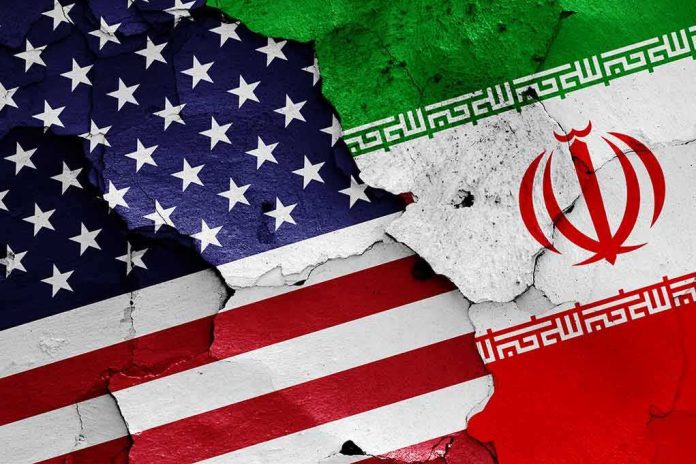
Iran’s top clerics have issued religious death warrants for President Trump and Israeli Prime Minister Netanyahu, declaring them “enemies of God” and authorizing their assassination by Muslims worldwide.
Key Takeaways
- Grand Ayatollah Naser Makarem Shirazi issued fatwas against President Trump and Prime Minister Netanyahu, labeling them as “enemies of God” and calling for their assassination.
- The religious edicts declare that any threat to Iran’s leadership makes one a “warlord” (mohareb), punishable by death, crucifixion, or exile under Islamic law.
- These fatwas enable Iran’s security forces to intensify crackdowns on internal dissidents perceived as aligned with the U.S. or Israel.
- The declarations follow Israeli bombings that killed Iranian military commanders and scientists, plus U.S.-Israeli strikes on Iranian nuclear facilities.
- President Trump responded by stating he had spared Ayatollah Khamenei’s life and was considering sanctions relief before Iran’s hostile rhetoric changed his mind.
Iran’s Deadly Religious Edicts Against Western Leaders
Grand Ayatollah Naser Makarem Shirazi and Grand Ayatollah Hossein Nouri Hamedani have issued formal religious rulings (fatwas) that explicitly target President Donald Trump and Israeli Prime Minister Benjamin Netanyahu for assassination. These edicts declare both leaders “enemies of God” and authorize punishment under Islamic law. The declarations state that “Any person or regime that threatens the Leader or Marja (May God forbid) is considered a ‘warlord’ or a ‘mohareb’,” said Grand Ayatollah Naser Makarem Shirazi, one of Iran’s most influential clerics.
The fatwas also criminalize any support for the American and Israeli leaders, stating: “Any cooperation or support for that enemy by Muslims or Islamic states is haram or forbidden. It is necessary for all Muslims around the world to make these enemies regret their words and mistakes,” according to Grand Ayatollah Naser Makarem Shirazi. This language is particularly alarming as it effectively calls for global Muslim action against the two leaders, similar to the infamous 1989 fatwa against author Salman Rushdie, which resulted in numerous assassination attempts over decades.
Escalation After Military Exchanges
These religious pronouncements follow a period of intense military conflict between Iran, Israel, and the United States. Israeli forces conducted precision strikes that eliminated several top Iranian military commanders and scientists involved in Iran’s nuclear program. Iran retaliated with missile strikes against Israeli cities, prompting further escalation. The conflict expanded when U.S. and Israeli forces jointly targeted Iranian nuclear facilities, leading Iran to attack an American military installation in Qatar before a ceasefire was finally negotiated.
“Any person or regime that threatens the Leader or Marja (May God forbid) is considered a ‘warlord’ or a ‘mohareb’,” said Grand Ayatollah Naser Makarem Shirazi.
While fatwas are technically non-binding religious opinions in Islam, those issued by high-ranking clerics in Iran carry significant political and religious weight. The status of these particular clerics as Marjas (sources of emulation) in Shia Islam means their pronouncements will be taken seriously by millions of followers throughout Iran and beyond. The Iranian regime has historically used such religious declarations to mobilize support for its policies and to justify aggressive actions against perceived enemies.
Internal Crackdown Authorized
Perhaps most concerning for human rights advocates is how these fatwas will be weaponized domestically. The edicts effectively authorize Tehran’s internal security forces to detain and execute anti-regime dissidents by labeling them as collaborators with the “enemies of God.” Security forces can now claim religious authority to intensify ongoing crackdowns against opposition figures, protestors, and anyone perceived to be sympathetic to American or Israeli positions. The fatwa’s language recalls a similar 1988 religious decree by Ayatollah Khomeini that resulted in mass executions of political prisoners.
“Any cooperation or support for that enemy by Muslims or Islamic states is haram or forbidden. It is necessary for all Muslims around the world to make these enemies regret their words and mistakes,” said Grand Ayatollah Naser Makarem Shirazi.
President Trump responded to the fatwas by revealing he had previously spared Iranian Supreme Leader Ayatollah Khamenei from assassination. Trump stated that he had been considering offering sanctions relief to Iran but reversed course after these hostile declarations. The Biden administration, which has largely continued Trump’s firm stance toward Iran, has yet to issue an official response to these provocative religious rulings. The fatwas underscore the fragility of regional stability and demonstrate Iran’s continued commitment to confrontation rather than diplomacy.
Iran’s Desperate Show of Strength
These fatwas represent a desperate attempt by Iran’s clerical leadership to project power after suffering significant military and intelligence defeats. The regime has been severely weakened by successful Israeli operations against its military leadership, continued economic sanctions, and growing internal dissent. By issuing these inflammatory religious edicts, Tehran hopes to rally support among its base while intimidating domestic opposition. However, this dangerous rhetoric only further isolates Iran from the international community and potentially exposes it to additional sanctions or military responses from the United States and its allies.







